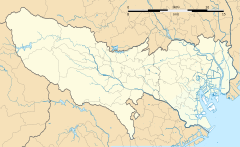Takaosanguchi Station (高尾山口駅, Takaosanguchi-eki)is a passenger railway station located in the city of Hachiōji, Tokyo, Japan, operated by the private railway operator Keio Corporation. It is the main point of railway access to Mount Takao.
Takaosanguchi Station 高尾山口駅 | ||||||||||||||||
|---|---|---|---|---|---|---|---|---|---|---|---|---|---|---|---|---|
 Takaosanguchi Station in March 2016 | ||||||||||||||||
| General information | ||||||||||||||||
| Location | 2241 Takao-machi, Hachiōji-shi, Tokyo 193-0844 Japan | |||||||||||||||
| Coordinates | 35°37′56″N 139°16′12″E / 35.632224°N 139.269882°E | |||||||||||||||
| Operated by | ||||||||||||||||
| Line(s) | ||||||||||||||||
| Distance | 44.7 km from Shinjuku | |||||||||||||||
| Platforms | 1 island platform | |||||||||||||||
| Tracks | 2 | |||||||||||||||
| Connections | Bus stop | |||||||||||||||
| Other information | ||||||||||||||||
| Station code | KO53 | |||||||||||||||
| Website | Official website | |||||||||||||||
| History | ||||||||||||||||
| Opened | 1 October 1967 | |||||||||||||||
| Rebuilt | 2015 | |||||||||||||||
| Passengers | ||||||||||||||||
| FY2019 | 10,431 | |||||||||||||||
| Services | ||||||||||||||||
| ||||||||||||||||
| ||||||||||||||||
Lines
editTakaosanguchi Station is the terminus of the Keio Takao Line, and is located 8.6 kilometers from the starting point of the line at Kitano, and 44.7 kilometers from Shinjuku Station in central Tokyo. The station is numbered "KO53".
Station layout
editTrack layout | |||||||||||||||||||||||||||||||||||||||||||||||||||||||||||||||
|---|---|---|---|---|---|---|---|---|---|---|---|---|---|---|---|---|---|---|---|---|---|---|---|---|---|---|---|---|---|---|---|---|---|---|---|---|---|---|---|---|---|---|---|---|---|---|---|---|---|---|---|---|---|---|---|---|---|---|---|---|---|---|---|
| |||||||||||||||||||||||||||||||||||||||||||||||||||||||||||||||
The station has a single dead-headed island platform serving two tracks located on the second floor ("2F") level, with the station entrance and concourse located on the ground floor.
Platforms
edit| 1/2 | KO Keiō Takao Line | for Takao and Kitano KO Keio Line for Takahatafudō, Chōfu, Meidaimae, and Shinjuku S Toei Shinjuku Line for Motoyawata |
-
Platform 2 looking toward Kitano in February 2009
-
Platform 2 looking toward the buffer stops in March 2016
-
The buffer stops at the ends of the tracks in November 2014
-
Keio Takaosan Onsen Gokurakuyu(Construction next to station)
History
editThe station opened on October 1, 1967.[1]
The station building was rebuilt in 2015 using wood from local cedar trees in a redesign overseen by architect Kengo Kuma, with work completed in April 2015. The station roof is modelled after the Yakuo-in Temple complex on Mount Takao.[2]
Passenger statistics
editIn fiscal 2019, the station was used by an average of 10,431 passengers daily.[3]
The passenger figures (boarding passengers only) for previous years are as shown below.
| Fiscal year | daily average |
|---|---|
| 2005 | 7,423[4] |
| 2010 | 10,268[5] |
| 2015 | 11,110[6] |
Surrounding area
edit- Mount Takao
- National Route 20
- Kiyotaki Station on the Takaotozan Railway
See also
editReferences
edit- ^ Terada, Hirokazu (19 January 2013). データブック日本の私鉄 [Databook: Japan's Private Railways] (in Japanese). Japan: Neko Publishing. p. 229. ISBN 978-4-7770-1336-4.
- ^ "Railways incorporating more wood in train stations to give them rustic, natural feel". The Japan Times. Japan: The Japan Times Ltd. 24 August 2016. Archived from the original on 25 August 2016. Retrieved 25 August 2016.
- ^ 1日の駅別乗降人員 [Station passenger figures (Fiscal 2019)] (in Japanese). Japan: Keio Railway Company. Retrieved 29 January 2021.
- ^ 東京都統計年鑑 平成17年 9 運輸及び通信 [Tokyo Metropolitan Government statistics (fiscal 2005)] (in Japanese). Japan: Tokyo Metropolitan Government. Retrieved 26 March 2021.
- ^ 東京都統計年鑑 平成22年 [Tokyo Metropolitan Government statistics (fiscal 2010)] (in Japanese). Japan: Tokyo Metropolitan Government. Retrieved 26 March 2021.
- ^ 東京都統計年鑑 平成27年 9 運輸及び通信 [Tokyo Metropolitan Government statistics (fiscal 2010)] (in Japanese). Japan: Tokyo Metropolitan Government. Retrieved 26 March 2021.
External links
editMedia related to Takaosanguchi Station at Wikimedia Commons

